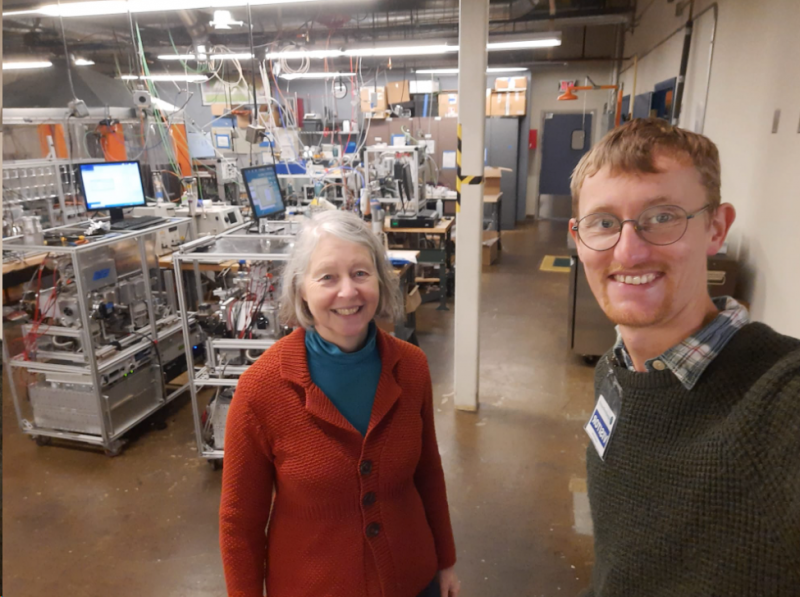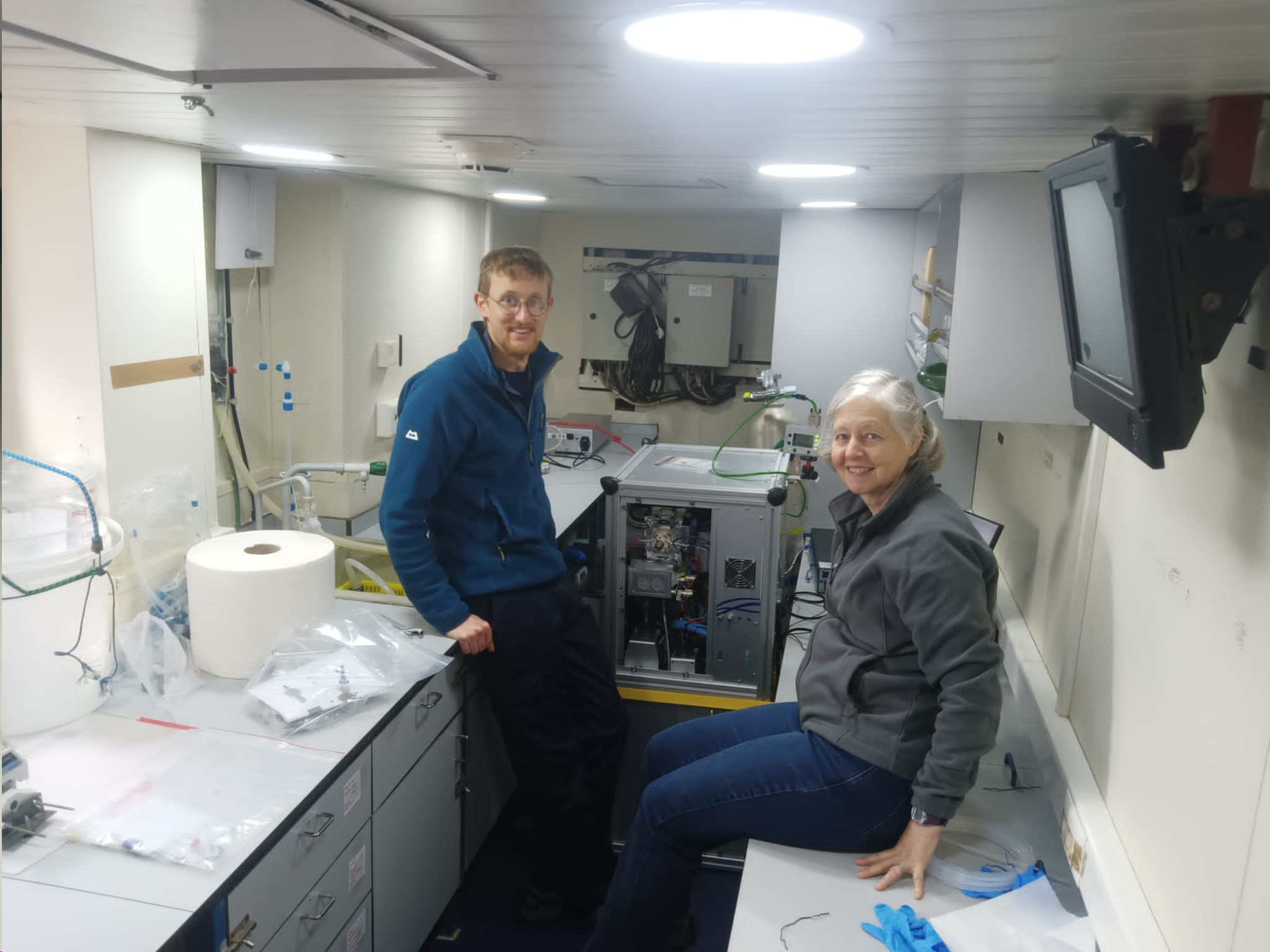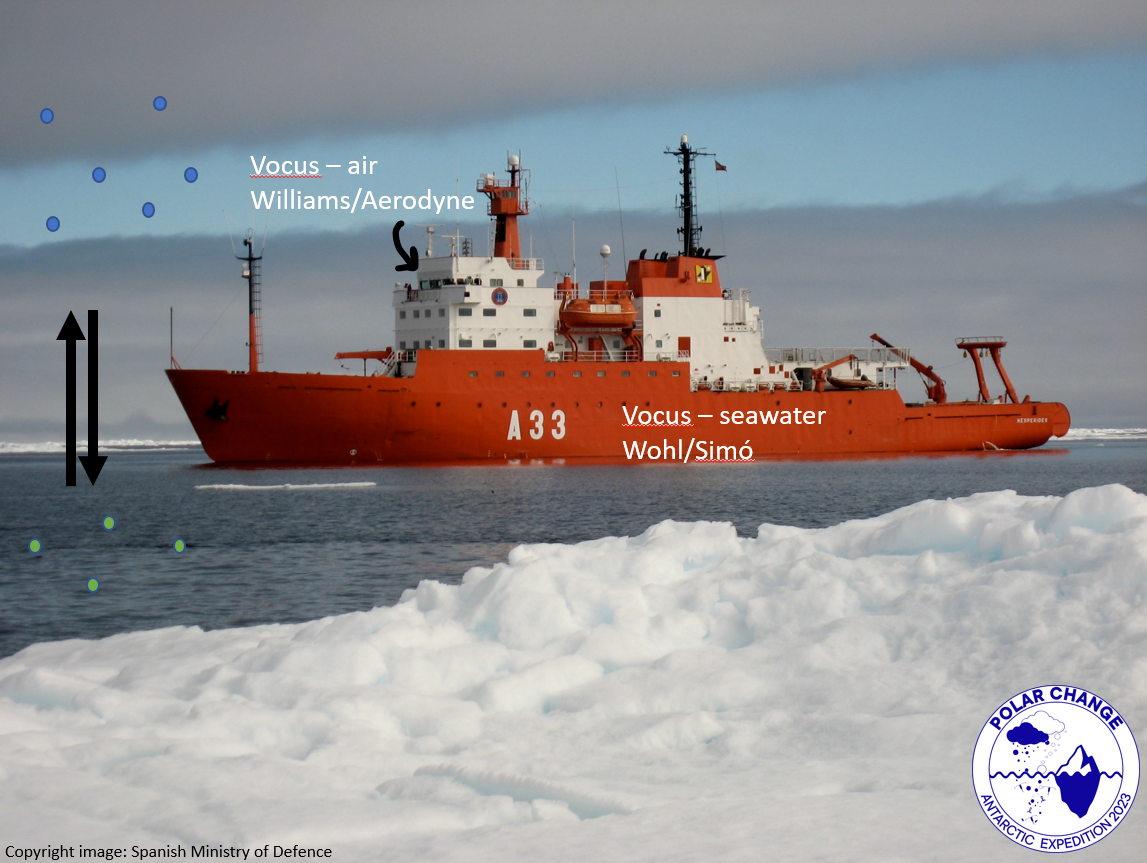Visit Aerodyne in Boston
Charel Wohl
University of East Anglia

Caption: Charel Wohl with Leah Williams showing him one of the laboratories at Aerodyne Research Inc. hosting an impressive number of instruments.
Charel Wohl is an early career researcher whose PhD and post-doc research focused on measuring volatile organic compounds and sulfur containing compounds dissolved in seawater and in ambient air to calculate sea-to air fluxes. After completing his PhD at Plymouth Marine laboratory in summer 2021, Charel moved abroad to pursue a post-doc in Barcelona at the ICM-CSIC improving his mass spectrometry skills by using a Vocus-PTR-ToF from Aerodyne Research, Inc. and taking part in Antarctic fieldwork (POLAR-CHANGE) using this instrument.

Caption: Charel and Leah Williams in Antarctica repairing one of the Vocus-PTR-ToF instruments on board.
Charel applied for the stepping stone bursary in April 2023 hoping to visit Aerodyne in Boston, MA to learn more about the details of operating and analysing Vocus data. The aim of the meeting was to share some of the data collected by another Vocus on board, measuring ambient air. Data from both instruments will be used to calculate sea-to-air fluxes of sulfur compounds from this cruise and speculate on the biogeochemical sources of these compounds. Like many researchers coming straight out of their PhD’s, Charel had little to no experience of independently applying for external funding to complete a short project. At that point in his career writing a justification to complete a piece of work was an extremely valuable experience as it has subsequently helped him when applying to more recent funding opportunities.
Charel’s application to the bursary was successful and he was able to use the bursary to fund the trip on the back of a visit to AGU 2023, with the intent of saving some carbon emissions. During the three-day-visit, Charel worked closely with Leah Williams from Aerodyne to process measurements from POLAR-CHANGE. Having not received in person training on the instrument due to the COVID pandemic, this visit allowed Charel to confirm his knowledge and talk about some artefacts he observed during the cruise. Charel also gave a presentation to the scientific staff at Aerodyne and interacted with a range of people with different interests, including high resolution mass spectrometers, gas chromatographs and measuring VOCs in seawater and soil using a membrane.

The decision to apply for the bursary has paid off. Half a year on from the receipt of the bursary, Charel has been able to use his expertise in running the Vocus at UEA in the laboratory, but fieldwork is planned at Weybourne in spring. Charel also shared some insights from his trip with Aerodyne instrument-users at the MLU mass spectrometry working group at FAAM. In the meantime, Charel is working on a publication focussing sea-to-air fluxes from the POLAR-CHANGE cruise involving many of the people Charel interacted with during his visit.
Charel would encourage other early career researchers to apply for the bursary. For those having doubts about applying he would like to highlight that the flexibility of the bursary means that it can be used in many different ways and the funding is upfront and not conditional on any research output. The bursary helped Charel learn new research skills and eventually helped him feel more confident in his Vocus analysis skills which will hugely benefit the CARES and MLU community.
Profile
Charel Wohl is now working as a Senior research Associate at the University of East Anglia with NCAS, where his research focusses on transport and processing of marine sulfur emissions over the North Atlantic as part of the CARES project. His work is also funded by the FAAM MLU and involves making measurements using a high spec Vocus-PTR-ToF refitted to fly on the FAAM aircraft. Charel enjoys taking good measurements at remote sites, be it aloft or at the poles, to help us better understand the global climate system and the marine atmosphere.
Latest News
Marine Data Management, Governance and the MEDIN toolset
The Marine Environmental Data and Information Network (MEDIN) and OceanWise are delighted to invite you to attend our popular free online training workshop: ‘Marine Data Management, Governance and the MEDIN toolset’ on the 19th – 23rd of May 2025.
Workshop on the contribution of UK Arctic Ocean science to the International Polar Year 32/33
12:00 11th June – 16:00 12th June 2025: NOC Southampton (In-person with online option): Registration deadline 16th May
REGISTER HERE
Pre-meeting questionnaire (open to all)
The purpose of this workshop is for the UK Ocean Science community to discuss and then draft a prospectus document outlining the priority Arctic research questions the community would like to address during the run up to, throughout and beyond the International Polar Year 32/33. Additionally, to identify what unique strengths and technologies the UK has to help fill these knowledge gaps.
The second day of the workshop will be dedicated to writing groups, one for each of the priority research questions identified - from both the pre-meeting questionnaire (HERE) and day one discussion. By the end of the meeting, each group will have produced draft text and sourced supporting figures for the prospectus.
Post meeting, the draft will be opened for comments and suggestions from everyone, regardless of whether they were able to attend the workshop or not. It will then be shared with UK funders (UKRI, FCDO, DSIT, ARIA) and potential international programmes with whom we would like to collaborate (e.g. Arctic 2050, Norway). It will form a basis from which wider integration with terrestrial, atmospheric and cryosphere communities can be built, e.g. at the UK Arctic Science Meeting in September in Northumbria.
To ensure balanced community and ECR representation, and to ensure that the size of the writing groups is efficient and effective, if the number of registrations from individual institutes becomes overwhelming, we may contact individuals or teams and ask that each institute selects a smaller number of individuals to attend in-person. Please wait for confirmation of in-person attendance before finalising travel arrangements.
The workshop will be open to hybrid attendance and contributions on both days.
Challenger Society Council Position Vacancy
The Challenger Society for Marine Science (CSMS) are pleased to announce an exciting opportunity to support the next generation of ocean scientists and innovators. CSMS are looking for a new Council member to fill the Student Travel Awards and Stepping Stones Portfolio. The successful applicant will administer the travel and research grants available for Early Career Researchers.
The role involves:
- Receiving applications for the two schemes and responding to applicant inquiries
- Soliciting and compiling input from the rest of the Council for assessing the applications
- Communicating with successful and unsuccessful applicants for the two schemes
- Working with the Honorary Treasurer on allocating funds to successful applicants
- Following up with award winners on their reporting requirements
- Attending Council meetings four times a year (in person or online) and contributing to discussions and decision making for CSMS
The usual term for Council members is three years.
For more information about the CSMS Council, please follow this link: https://www.challenger-society.org.uk/The_Council
For more information about our Early Career Researcher grants and awards, please follow this link:
https://www.challenger-society.org.uk/Stepping_Stones
and
https://www.challenger-society.org.uk/Travel_awards
If you are interested in applying or have any questions regarding the role, please contact kathen@bas.ac.uk
